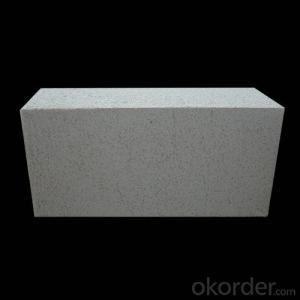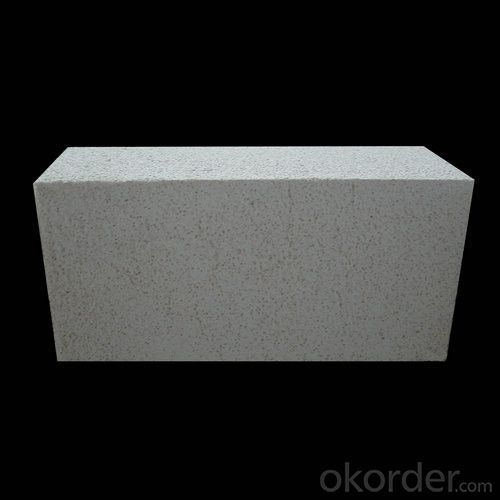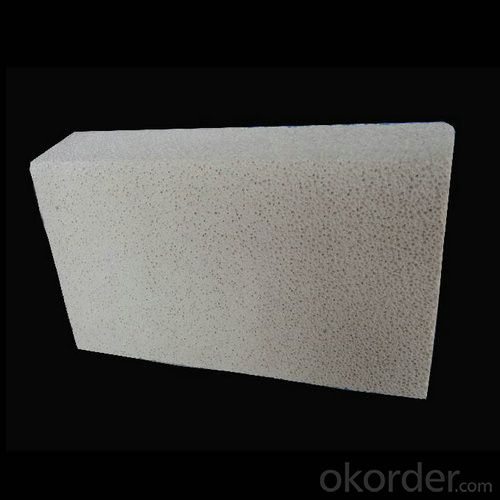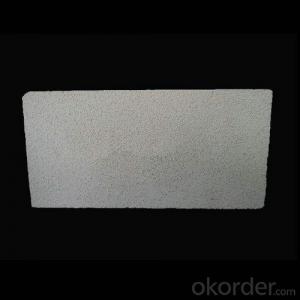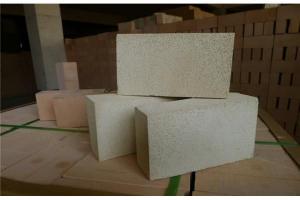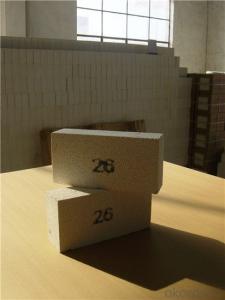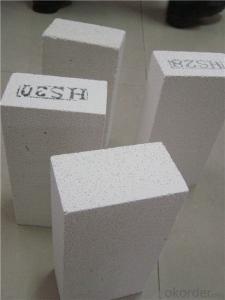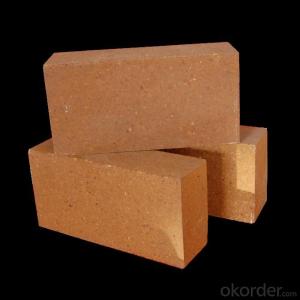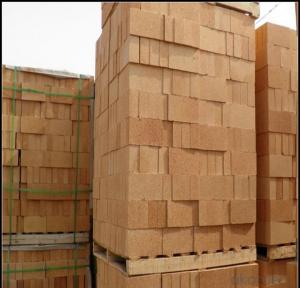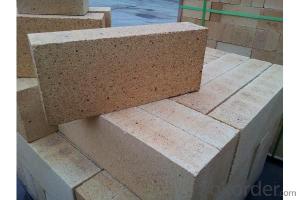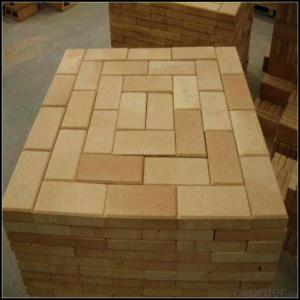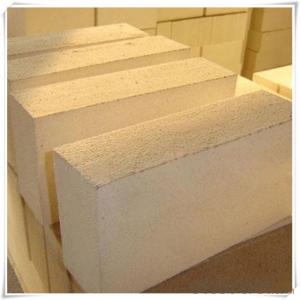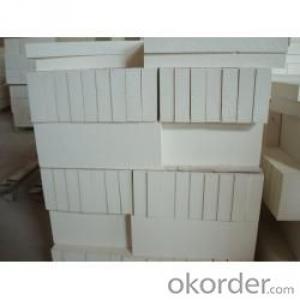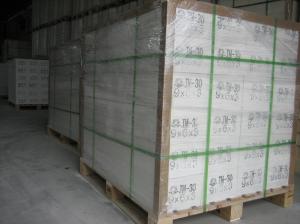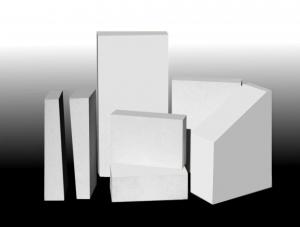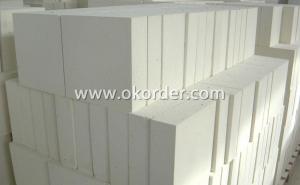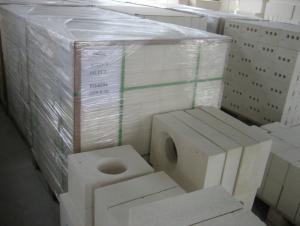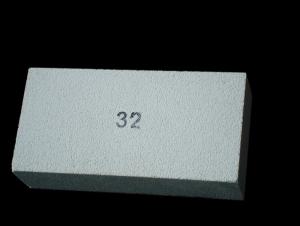Insulating Fire Brick for Industry Kilns - Lightweight, 2300F, 2600F, 2800F, 3000F
- Loading Port:
- Shanghai
- Payment Terms:
- TT OR LC
- Min Order Qty:
- 1 m.t.
- Supply Capability:
- 1000000 m.t./month
OKorder Service Pledge
OKorder Financial Service
You Might Also Like
Insulating firebrick
Insulating firebrick gains typical advantages including low thermal conductivity,fine thermal shock resistance,low heat containment and low iron content,meanwhile,the outstanding mechanical flexibility,coupled with high insulating efficiency expands the extensive applications of IFB in a variety of industrial markets.Our insulating firebrick is manufactured from high-grade refractory powder and materials in good purity.During the process of production,organic and multiple filling materials are injected according to the required proportion,the brick is compressed in vacuum and sintered under high temperature.
Features
Low thermal conductivity
High purity and low iron content
Good thermal resistance with direct access to fire
Superior thermal shock resistance
Accurate dimension and easy cutting
Typical Applications
Cracking furnace
Conversion furnace
Heating equipment
Refining equipment
Reproduction equipment
Hot blast stove
Description | Grade 23 | Grade 26 | Grade 28 | Grade 30 | |
Classification Temperature | 1300C/2372F | 1400C/2552F | 1500C/2732F | 1550C/2822F | |
Density(kg/m3) | 600 | 800 | 900 | 1000 | |
Cold Crushing Strength (MPa) | 1.2 | 1.8 | 2.5 | 3.3 | |
Modulus of Rupture(MPa) | 1.0 | 1.7 | 2.3 | 3.1 | |
Permanent Linear Change (%)x24hrs | ≤0.6 | ≤0.6 | ≤0.8 | ≤0.9 | |
Thermal Expansion (%)1000C | 0.5 | 0.52 | 0.52 | 0.53 | |
Thermal Conductivity (W/m.k) | 350C | 0.18 | 0.25 | 0.33 | 0.38 |
400C | 0.20 | 0.29 | 0.35 | 0.40 | |
600C | 0.24 | 0.32 | 0.37 | 0.42 | |
Chemical Composition (%) | Al2O3 | 42 | 56 | 67 | 73 |
SiO2 | 55 | 41 | 30 | 24 | |
Fe2O3 | ≤1 | ≤0.8 | ≤0.7 | ≤0.7 | |
K2O+Na2O | 1.1 | 1.7 | 1.7 | 1.7 | |
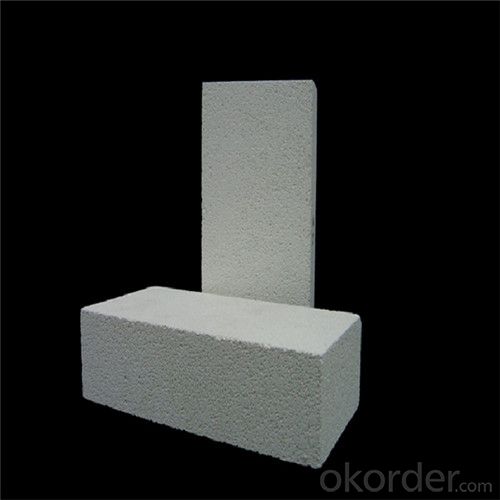
FAQ
Q3: Can you offer Door-to-Door delivery?
A3: Yes, but only for some countries such us U.S., UAE, Saudi Arabia, Iran, and Russia, etc.
Q4: What is the minimum quantity?
A4: There is no minimum order quantity. Depending on the item and processing, there may be a minimum production required, however we can offer a quotation based only on the quantity you need.
- Q: Can insulating fire bricks be used in the construction of pizza ovens?
- Yes, insulating fire bricks can be used in the construction of pizza ovens. These bricks have excellent heat retention properties which help to create a high and even temperature inside the oven. Additionally, their insulating properties help to decrease heat loss, making them ideal for pizza ovens where maintaining a consistent and high temperature is crucial for achieving crispy and delicious pizzas.
- Q: What is the typical modulus of rupture of an insulating fire brick?
- The modulus of rupture of an insulating fire brick can differ based on the brick's particular composition and manufacturing method. On average, insulating fire bricks usually have a modulus of rupture ranging from 1 to 10 megapascals (MPa). This indicates that these bricks can endure a bending force or pressure of 1 to 10 MPa before they fracture or break. It should be emphasized that the modulus of rupture can be affected by factors like the density, porosity, and chemical composition of the insulating fire brick.
- Q: Can insulating fire bricks be used in both residential and industrial applications?
- Yes, insulating fire bricks can be used in both residential and industrial applications. They are commonly used in residential fireplaces and wood-burning stoves for their insulating properties, as well as in industrial furnaces, kilns, and ovens to retain heat and improve energy efficiency.
- Q: Are insulating fire bricks suitable for insulation in boilers for steam generation?
- Insulating fire bricks are a suitable choice for insulation in steam generation boilers. Specifically designed to possess exceptional thermal insulation properties, these bricks are perfect for high-temperature applications like boilers. With their low thermal conductivity, they effectively minimize heat transfer and prevent heat loss. This insulation capability aids in maintaining optimal temperatures within the boiler, thereby enhancing energy efficiency and reducing fuel consumption. Moreover, these bricks can withstand thermal shock, making them highly resistant to the extreme temperature fluctuations encountered during steam generation. Overall, incorporating insulating fire bricks into steam generation boilers can significantly improve the system's thermal efficiency and performance.
- Q: What is the bulk density of the sintered bricks?
- The Dragon such high aluminum refractory brick density is generally around 1000, heavy refractory brick, high alumina brick HLGX heavy weight in general 2000Kg/m fand.
- Q: Can insulating fire bricks be used as a backup insulation material?
- Yes, insulating fire bricks can be used as a backup insulation material. Insulating fire bricks are designed to have a high thermal resistance and low thermal conductivity, making them suitable for providing insulation in high-temperature applications. They can be used as backup insulation behind other refractory materials to enhance insulation properties and improve the overall thermal efficiency of a system.
- Q: Can insulating fire bricks be used in the construction of steel rolling mills?
- Insulating fire bricks have the capability to be utilized in the construction of steel rolling mills. With their exceptional thermal insulation properties, these bricks are designed specifically for applications that necessitate high temperatures and heat containment. They prove to be suitable for lining the walls of furnaces, ovens, and other heat-processing equipment within steel rolling mills due to the involvement of elevated temperatures. The utilization of these bricks aids in diminishing heat loss, enhancing energy efficiency, and maintaining a steady temperature environment, which is of utmost importance during the steel rolling process. Furthermore, the lightweight nature and ease of installation of insulating fire bricks make them a practical and advantageous choice for construction purposes in steel rolling mills.
- Q: Are insulating fire bricks resistant to gas permeability?
- Insulating fire bricks possess gas impermeability, as they are engineered with low porosity and high density. These bricks are crafted from superior refractory materials like clay or silica and undergo a unique manufacturing process that guarantees minimal pore size and compactness. Consequently, they excel at containing gases and averting leakage. Widely employed in high-temperature settings such as furnaces, kilns, and industrial boilers, insulating fire bricks play a critical role in ensuring efficient and safe operations by maintaining gas tightness.
- Q: Can insulating fire bricks be used for insulation in glass manufacturing?
- Insulation in glass manufacturing can be achieved using insulating fire bricks. These bricks are specifically designed to possess exceptional thermal insulation properties, a high resistance to heat, and low thermal conductivity. These qualities make them well-suited for situations where the maintenance or control of high temperatures is necessary, such as in glass manufacturing processes. The implementation of insulating fire bricks in glass manufacturing contributes to the reduction of heat loss and the enhancement of energy efficiency. By insulating the furnace or kiln, these bricks prevent excessive heat from escaping, resulting in a decreased energy requirement to sustain the desired temperature. This not only leads to savings in energy costs but also facilitates the establishment of a more stable and regulated environment for the glass manufacturing process. Moreover, insulating fire bricks possess the ability to endure the extreme temperatures typically encountered during glass manufacturing, thus making them a dependable choice for insulation. With a capacity to withstand temperatures reaching up to 3000 degrees Fahrenheit (1650 degrees Celsius), these bricks remain structurally intact and effective in their insulation function within the furnace or kiln. To summarize, the exceptional thermal insulation properties, high heat resistance, and low thermal conductivity of insulating fire bricks render them a suitable option for insulation in glass manufacturing. Their implementation aids in the enhancement of energy efficiency, the maintenance of stable temperatures, and the creation of a controlled environment for the glass manufacturing process.
- Q: Can insulating fire bricks be used for insulation in chemical storage tanks?
- Yes, insulating fire bricks can be used for insulation in chemical storage tanks. These bricks have excellent thermal insulation properties and can withstand high temperatures, making them suitable for insulating tanks that store chemicals.
Send your message to us
Insulating Fire Brick for Industry Kilns - Lightweight, 2300F, 2600F, 2800F, 3000F
- Loading Port:
- Shanghai
- Payment Terms:
- TT OR LC
- Min Order Qty:
- 1 m.t.
- Supply Capability:
- 1000000 m.t./month
OKorder Service Pledge
OKorder Financial Service
Similar products
Hot products
Hot Searches
Related keywords
